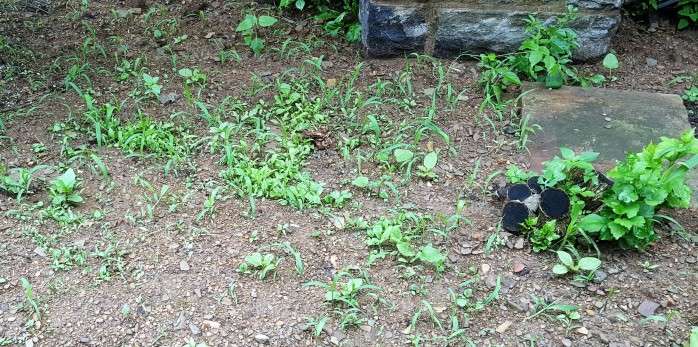He said many things to them in parables: “A farmer went out to scatter seed.
 I’m a novice gardener. I plant flowers and vegetables requiring very little oversight. Last year, my spouse and I decided to set up a raised bed with wildflowers attracting butterflies and bees. He and a colleague did almost all of the labor. I bought the seeds and distributed them into the bed in a very haphazard, California free style approach. Seeds of all sorts got tossed into the bed together and the silent battle for soil, water, and sun began. The Mexican Sunflowers won the season. They grew the fastest and tallest. Xenias and Purple Coneflowers didn’t do as well.
I’m a novice gardener. I plant flowers and vegetables requiring very little oversight. Last year, my spouse and I decided to set up a raised bed with wildflowers attracting butterflies and bees. He and a colleague did almost all of the labor. I bought the seeds and distributed them into the bed in a very haphazard, California free style approach. Seeds of all sorts got tossed into the bed together and the silent battle for soil, water, and sun began. The Mexican Sunflowers won the season. They grew the fastest and tallest. Xenias and Purple Coneflowers didn’t do as well.

This year, I adopted a new strategy in the church garden where I serve. The garden was an overrun mess. Fortunately, the church hired a landscaper to do the hard work. I cleverly avoided mulching the yard and digging out most of the weeds. However I chose one spot to leave rough. I hacked the weeds and grass out of it but I didn’t treat it with any mulch or much potting soil. Then I threw some wildflower seeds into it. That was about a month, maybe six weeks ago. Some of those seeds have taken root as you can see. I water them whenever I water the rest of the gardens. Fortunately too, we’re having a wet and muggy July here in PA. Thus, there are some weeds and grass that are resurfacing along with the wildflowers in the area. Summer seasonal garden games – take two.

On the other hand, I decided to be more intentional about a small section in another garden area. I used potting soil as a base for the seeds. I thoroughly disposed of the weeds and grass. Once the seeds were settled, I watered them thoroughly. I asked the landscaper to be gentle with the wildflowers with mulch in the one area while leaving the other area alone. You can see that the seeds in good soil are thriving, for now.

Jesus’ parable of the sower, (or parable of the soils) [or parable of the seeds] depending upon your point of view, is excellent. A parable is a lesson that offers listeners an understandable way to view the world. However, parables at their best incorporate a challenge as well as perhaps an unexpected ending. New Testament scholar A.J. Levine writes that Jesus’ parables are “designed to afflict, to draw us in but leave us uncomfortable.” (Amy-Jill Levine, March, 2017, para. 2). Matthew’s parables are particularly confrontational because Jesus presents a great deal of judgmental outcomes. The sheep are separated from the goats as an example. (Mt. 25: 31-46). Jesus declares that The Kingdom of Heaven is much like my garden – in more ways than one. One man plants good seed and another man plants weeds in the same space. The weeds and the wheat grow up together. The outcome of the plants’ battle for sun, soil, water, and care is uncertain “until the harvest.” They must grow up together.” (Mt. 13: 24-30).

I was working in the rectory garden earlier this summer when I came upon some pieces of an old baptismal font. They were separated from one another and hidden under some hydrangea bushes. I rolled them out and set them aside. Just a couple of days ago, our landscaper set the font up in the yard. It is weathered and I’m not really sure how it go there, or why? Perhaps a giant wind or some strong-armed parishioners moved it out following a fire or some other calamity. The winds of history sweep across our memories and facts get lost in the ground.
Alexander J. Frick and H.F. Hawke donated the font to the church, sometime in the middle to late 19th Century. Mr. Frick was confirmed at Christ Memorial Episcopal in 1843. He was buried in 1915. He served as a Union Officer during the Civil War including the Battle of Gettysburg. He returned to Danville following the war to continue his law practice. (Deeben, 2000). Mr Hawke’s historical record is a little more difficult to determine other than he was a prominent contractor.
The garden font got me to thinking about baptism. Baptism, in terms of our Christian faith, is where seeds first get planted. The priest, family, sponsors, and gathered community have no way of knowing what will happen to the baptized person whether they be young or old. Those of us who baptize infants do so because we know, especially in churches as old as this one, that life’s gardens are full of all kinds of soil. Some children sadly die when they are young. Other children die on battlefields. Mr. and Mrs. Frick had at least one daughter, Elizabeth, who was baptized at Christ Memorial. Perhaps she began her Christian life in the font that is now in the garden? If not, certainly many, many children were immersed, buried, and raised up in Jesus Christ’s resurrection and the seeds of their life began to grow roots.
Each human life is a seed, sprout of God’s creative process. Some of us are really fortunate perhaps even privileged. We land in good soil. Our parents are generally stable. The family’s wealth is sufficient – though not overly so. The marriage of the mother’s and father’s genes are strong, resilient, and healthy. The tragedies of war, abandonment, and generational poverty do not pillage the parents or their children.
Sadly, the other fields of life are ripe with seeds too. Pennsylvania’s coal country isn’t too far from Danville. Poverty is rampant there and families can’t easily pull themselves up to higher levels of wealth and education. The soil doesn’t yield as much coal. Natural gas and other factors have changed the economic landscape. People are suffering. The Church’s work is to become compassionate workers in such rough soil.
However, as often as not, the seeds of our humanity spend time in all of sorts of soil, maybe coincidentally. The Christian life, at least for me, is an ongoing gardening process. I need to trust that the Holy Spirit’s wind will blow me out of the weeds when I’m lost. This is true and I still require the kernels of my faith to prompt me to be open to such transitions. All people spend time on the roads of their lives being tossed to and fro. The possibilities of dying spiritually and mortally are ever present and uncontrollable. Richard Rohr gently reminds us that those of us who seek a truly transformed life must come to expect and live into the unsettled ground of order, disorder, and reorder.
Gardening verifies a universal truth – life is chaotic. This year’s harvest of flowers, fruits, and weeds is hardly at all within my control. I remind myself first thing in the morning to water the plants when it hasn’t rained in awhile. Contemplative Prayer is a similar habit. It requires me to often till and let go of silent, anxious spiritual garden plots. I can’t control how much sun the seed gets or the wind will do, or how many birds will come to eat today or tomorrow. I can choose to remain connected to God who blesses me with all of these conditions.
Jesus encourages his followers with the words: “Happy are your eyes because they see. Happy are your ears because they hear.”
Happiness is not necessarily an easy virtue when wrestling with the weeds or being cooked by the sun. And, none of these realities negate the glory of God’s gracious harvest, today or when the end times come.
Blessings along The Way, Jim


